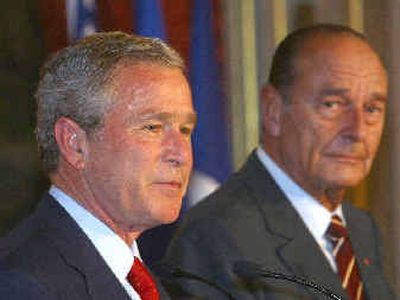Bush, Chirac narrow differences, but don’t erase them

PARIS – President Bush and President Jacques Chirac sought to move beyond bitter differences over Iraq on Saturday, with both suggesting a U.N. deal on post-occupation Iraq may be close. Still, the French leader reiterated his doubt about America’s justification for the war and said the situation in Iraq remains “extremely precarious.”
Still, despite exhibits of testiness on both sides at a joint news conference at Elysee Palace, Chirac told Bush at their private meeting that he believed the evolving U.N. Security Council resolution would pass unanimously, according to a U.S. official familiar with the session who spoke on condition of anonymity.
The public U.S.-French divisions stood in contrast with the show of solidarity earlier in the day in Rome between Bush and Italian Prime Minister Silvio Berlusconi.
On the eve of celebrations marking the 60th anniversary of D-Day, Bush and Chirac highlighted areas of agreement, from Afghanistan to the Middle East, from Haiti to Africa. “Free nations working together can overcome danger,” Bush said, citing the lessons of World War II.
Calling his talks with Bush trusting and sincere, Chirac endorsed many of Bush’s comments but remained critical about U.S. policy in Iraq. “There is a degree of chaos prevailing,” he said.
Chirac did not echo Bush’s recent efforts to link Iraq and the broader war on terror with the liberation of Europe that D-Day made possible.
Chirac said he understood why Bush has been comparing the Iraq war and the fight against terrorism to the liberation of Europe in World War II, given this weekend’s celebrations. But the French president said, “It is very difficult to compare historical situations that differ because history is not repetitive.”